From the Globe and Mail and Canadian Press – June 12, 2011
property. When Jessica Ernst drops a lit match into it, there’s a loud
poof and a flash of a blue flame – her well is contaminated with methane
gas. Watch video.
From the Globe and Mail and Canadian Press – June 12, 2011
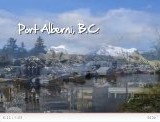
Coal mining protest song from Port Alberni, in response to the proposed Raven Underground Coal Project.
Compliance
Energy Corp has applied to mine coal in the Fanny Bay area within five
kilometers of Baynes Sound, home to B.C.’s largest shellfish industry
which provides about 600 jobs in the area.
The plan is to transport
the coal by truck or rail to Port Alberni, where a large loading and
storage facility would be built within very close proximity to homes and
businesses and directly in a tsunami zone. The project would provide a
mere 21 jobs for Port Alberni.
Federal and provincial environmental assessment agencies have announced a public comment period from May 18 to June 27. http://www.eao.gov.bc.ca/pcp/forms/Raven.html
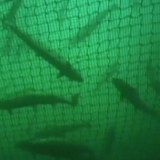
A proposal from Mainstream Canada – the local subsidiary of Norwegian aquaculture giant Cermaq – for a new 56-hectare open net pen salmon farm in Clayoquot Sound threatens the UNESCO Biosphere Reserve’s already hard-hit wild salmon stocks. The Common Sense Canadian posted a short film last year (scroll down to watch) on the research being conducted in Clayoquot and the compelling links it is drawing between sea lice from the 20 or so farms in the region and dwindling wild Chinook and chum stocks.
The proposal from Mainstream – which already operates 14 farms in Clayoquot – is prompting calls for a salmon farm moratorium in BC. The Coastal Alliance for Aquaculture Reform (CARR) – a coalition of provincial conservation groups – has joined the Friends of Clayoquot Sound in opposing the new farm, the first proposal of its kind since the federal government reclaimed jurisdiction over aquaculture last year.
Mainstream needs to obtain a tenure from the Province to operate on crown land and subsequent approval from DFO to build the farm. The company hopes to start stocking its new farm in 2012 – but will likely face intense opposition from the public and local and provincial environmental groups.
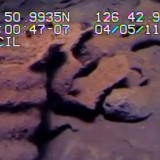
New underwater video shot by researchers working with salmon biologist Alexandra Morton reveals in graphic detail the waste from a number of salmon farms covering the ocean floor beneath them.
According to a press release today from Morton’s group Salmon Are Sacred, “Jody Eriksson, who collected the waste samples and filmed under the farms, said: ‘It’s a wasteland down under the farms. We were shocked: piles of faeces, rotting feed, bacterial mats and bubbling gases’ a bottom smothered by waste. This is out of sight damage must be exposed!’
All video from Alexandra Morton’s Vimeo page.
Video# 1: In the Broughton Archipelago, under a Marine Harvest salmon
farm. The bubbles are methane. The waste is heaped in mounds devoid of
life other than bacteria. This was once a productive crab ground. The
Norwegian company just moved its livestock to another site and are
carrying on business as usual. The federal government gave this site a
licence to operate despite this obvious pollution, the province who is
supposed to be managing our seafloor has done nothing.
Video #2: Bacteria growing under a Marine Harvest farm in the Broughton Archipelago. The white is bacteria called Beggiatoa. It grows in the sulfur-loaded
environments associated with sewage, in this case tons of fish manure
under Marine Harvest’s feedlot. This was once rich crabbing grounds.
Marine Harvest just moved their livestock to another place in Broughton.
Apparently this is OK with the federal government because they just
issued a licence to continue dumping here.
Video #3: Healthy Glass Reef-Building Sponge, not affected by salmon farm waste. This is what these sponges should look like. Scroll down to next video to see dead sponges under a salmon farm.
Video #4: Dead Reef-Building Glass Sponges Under Salmon Farm. Reef-building sponges are extremely slow growing and remarkable fish
habitat in BC. The damage from this Cermaq/Mainstream salmon feedlot – owned largely by the
Norwegian government – will take hundreds of years to heal if ever.
Video #5: Approaching a mound of salmon farm waste.
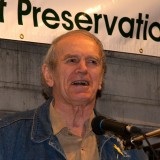
Harold Steves, co-founder of BC’s Agricultural Land Reserve, was honoured recently for his unparallelled contribution to protecting BC’s food security. Harold’s discovery in the late 1950s that his farm in the Richmond community of Steveston (named for the Steves family) had been secretly rezoned to residential – along with the bulk of Richmond’s farmland – spurred him on to a lifetime of work in the political arena to protect the rest of the province’s agricultural land. As a young MLA in 1973, Harold successfully brought forward the idea of the Agricultural Land Reserve – the first of its kind in the world. After a stint in the Legislature, Harold joined Richmond City Council, where he continues today as the province’s longest-serving municipal politician. At a time when BC’s food security is more imperiled than ever, one can only imagine where we’d be without the leadership, vision, and dedication of Harold Steves. Thank you to Harold for over half a century of standing up for BC’s farmland!
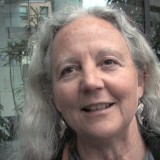
I am a biologist and resident of a tiny coastal community on the coast of British Columbia.
When salmon farms arrived I believed the government promotion that itwould be good for my community.
But now that the industry has surrounded us with 27 huge Norwegian
salmon feedlots, there are only 8 people left, the First Nations oppose the
industry, our school is closed, we have the sea lice epidemics, mounds of waste
only bacteria can grow on, toxic algae blooms and zero jobs in the industry. We
learned at the Cohen Inquiry that the federal government has offered to sell
this Norwegian industry to us, the people of Canada. My town was based on wild
salmon through fishing, tourism and the arts. As the wild salmon went so we
went. We did not accept the low paying jobs as reward for allowing this
industry to destroy our coast.
Video from recent Alexandra Morton event in Vancouver – story continues below
Salmon feedlots break the natural laws unleashing bacteria,
viruses and sea lice. My lawyer, Greg McDade, questioned Dr. Laura Richards,
Director General of Science Pacific Region about the 2009 sockeye crash at the
Cohen Inquiry. We learned a briefing note sent to the Minister of Fisheries
stated that a virus is one of the leading suspected causes of the 2009 sockeye
collapse. We also learned DFO
muzzled their own scientist who made this discovery, Dr. Kristi Miller. Salmon
Leukemia virus is a retro virus like HIV. DFO never told the public and left us
to blame fishermen. They also refused to test the farm salmon in an
effort to find out where this virus is coming from.
Salmon farming has harmed wild salmon everywhere they
operate (Ford and Myers, 2008). Canada has already destroyed one earth’s
greatest natural food supplies, the North Atlantic cod, by muzzling their
scientists. Fisheries and Ocean Canada blindly adhered to bad policy kicking the
cod and the east coast economy over the cliff. Immediately after, the Hibernia
oils wells went onto the Grand Banks. Canada traded food security for oil, the
future for short-term gain for the corporate world. No one in DFO was held
accountable and there is every indication that they are doing this again in BC.
I am unwilling to accept our fate as victim of another bad,
misguided policy favouring industry over our communities. As soon as oil prices rise too
far the Norwegian salmon feedlot industry will not be able to afford shipping
ground up fish from Chile to feed their Atlantic salmon here in the Pacific.
They will walk away and we will be sitting like fools with viral epidemics and
piles of manure smothering a once productive seafloor.
All too often people feel helpless. Democracy is slipping
away under the crush of the global economy.We need to wake up right now and step into the process of
how we form governments.Members
of Parliament are our agents, nothing more. Eighty-five percent of British Columbians consider
wild salmon an icon; they bring in over $2 billion a year in wilderness tourism
and fishing, they are an essential bloodstream carrying nutrients to our
forests, they are food security. We want them and our political agents have no
business hiding the truth about them from us. It is time to elect people who will stand by us and defend
our rights and resources.
For these reasons I left home April 13th to go door-to-door
to as many federal candidate campaign offices as possible to get them on record: Do you support wild salmon, would you
protect them by removing salmon feedlots from BC waters, would they protect the
aquaculture workers by supporting land-based aquaculture farming species that
are more sustainable, lower on the food chain than salmon?
I have been down Vancouver Island to Nanaimo, across the
ridings of Vancouver, through Chilliwack to Kamloops, Enderby, Salmon Arm,
Mission. I will be continuing through the lower mainland and southern Vancouver
Island. It has been a fascinating
exploration. I am a biologist with very little political experience and I am on
a steep learning curve.
Here is what I have found out:
The Greens have
some candidates that are very impressive such as, Adriane Carr (Vancouver
Central) and Elizabeth May (Saanich – Gulf Islands). Sue Moen, (Vancouver
Island North) really tells it like she sees it, but is not electable. Some Greens should get out of the way
as they are not serious about winning. Both Carr and May strongly support
wild salmon.They would transition
workers in the industry to land-based aquaculture. I think Carr and May
would go a long way to bring balance to any government.
The Liberals
seemed uncertain of their position, with many candidates remaining silent, but
on April 18 Micheal Ignatieff said, “if fish farms are harming wild salmon
we’ve got to stop it, put it on land or stop it all together.” This is a much
stronger statement than the one made by Mike Holland (Vancouver Island-North)
who said, “We need to get the
science done to understand just what the relationship and impact is, and we
need to be prepared to go where the science takes us. If that takes us to
closed-containment only I support that, but I want the science first. I’m not
prepared to mandate a timeline at this stage.”I think Liberal Renee Heatherington (Saanich-Gulf
Islands) may be pushing her party
to establish a policy on this.
The Conservatives
avoided me, until April 18 when MP Cathy MacLeod accepted our request to meet
in Kamloops.I was really looking
forward to hearing the Conservative position, but as we sat down she said she
could only listen and not give a position. Senator Nancy Greene joined us.I have met Nancy before and know she is
a strong wild salmon supporter.MacLeod’s attitude shifted during the meeting. I think she wanted to see
me as a nut, but as I outlined how the federal government has been hiding a
virus in the sockeye, I saw a change in her and she did say the Conservatives
are awaiting the Cohen decision. This is really not good enough.I have seen three major government
reviews on salmon farming entirely ignored by the provincial and federal
governments. The Cohen Inquiry is not a fish farm review, even if it finds
impact on the sockeye it is not mandated to do a thorough salmon farm
investigation.There is more than
enough evidence of harm to invoke the Precautionary Principle, which Canada
says it supports.
Conservative candidate John Duncan (Vancouver Island-North) told constituents in
Port McNeill that he supports continued salmon farming.At an All-Candidates meeting in Courtenay, Duncan’s seat was
empty – people call him “Mr. Invisible.”
Many of the Conservative offices are
very hard to find, and many people have told me the Conservatives do not attend the
All-Candidate meetings. Paul Forseth’s
(Burnaby–New Westminster) people didn’t want us to take pictures of their
office, saying it was private property. Colin Mayes’ campaign office address is
not on the internet – there is no website. His riding includes the Adams River,
one of earth’s biggest wild salmon runs. The people of Chilliwack-Fraser Canyon
are not pleased that Conservative MP Chuck Strahl just handed the candidacy to
his son Mark. The Conservatives get a thumbs down from me.
The NDP offices
are full of volunteers, people heading out the door with signs, tables of
coffee and snacks as no one has time to go home. Ronna-Rae Leonard (Vancouver
Island-North) is in full support of the people who make a living with wild
salmon, such as the wilderness tourism industry. But she says she is also
concerned with the people directly employed by the salmon farms. Thus she
supports building the infrastructure for a permanent land-based aquaculture
industry. Zeni Maartman (Nanaimo-Alberni) is a dynamo full of passion, energy
and deep commitment to both wild salmon and her riding. Don Davies, Vancouver-Kingsway met with
us and is a man of action, compassion and understanding, in strong support of
wild salmon. Fin Donnelly (New
Westminster-Coquitlam-Port Moody) joined me on the Paddle for Wild salmon
last fall, and is a hero to the wild salmon people province-wide. He tabled a
private member’s bill calling for removal of salmon farms onto land to protect
wild salmon and preserve jobs. Peter Julian (Burnaby-New Westminster) has
been involved with protecting wild salmon for a longtime.Denise Savoie (Victoria), Nathan Cullen
(Skeena-Bulkley Valley), and Jean Crowder (Nanaimo-Cowichan) have also supported wild salmon very
strongly through their careers. Cullen helped protect the North Coast from the
expansion of salmon feedlots into the mouth of the Skeena River. I am hoping the
NDP will become stronger in their platform to remove salmon farms from BC
waters.
Please follow what the politicians are saying at
VoteSalmon.ca
zzz

Watch Pacific Wild’s latest release – a beautiful short animation
focusing on the whales of the Great Bear Rainforest. Produced by Picture
Cloud film & animation of Victoria B.C., this visually stunning and
thought-provoking animation explores the dire threats facing whales by
acoustic ship pollution. The return of Humpback and other species of cetaceans to the waters of
the Great Bear Rainforest is a welcome event since the dark days when
whale killing ships travelled our waters. But this may be short lived if
oil tankers begin moving Alberta tar sands crude through the Great
Bears fragile waters.
The release of this animation is timely. On May 2nd the Canadian public
go back to the voting booths and only one federal party supports oil
tankers in the Great Bear Rainforest. Never has one election meant so
much to our coastal environment. From PacificWild.org
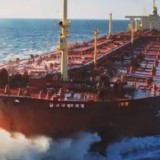
Watch this new 13 min short documentary from BC filmmaker Twyla Roscovich and CallingFromTheCoast.com on the proposed Enbridge Northern Gateway Pipeline and oil supertankers on BC’s coast.
From CallingFromTheCoast.com: “The north and central coast of British Columbia is one of last great wilderness areas that still supports a vibrant & productive ecosystem. Home to thousands of runs of salmon, steelhead, grizzlies, wolves, orca, rare white bears, dolphins, porpoises and hundreds of other species, the coast is a natural spring of wealth & wonder. The plan to build the Enbridge pipeline, with ensuing tanker traffic, threatens all of this- the coastal ecosystem, the coastal economies and local food security.
The BC coast supports many economies through commercial fishing, sport fishing & tourism, as well as providing massive natural food sources that feed thousands of people- serving up salmon, crab, halibut, clams, cockles, oolichan, herring, sea cucumbers, urchins, rockfish, lingcod, geoduck, seaweed, etc. A natural resource that just keeps giving. Enbridge plans to risk all of this to transport the dirtiest oil in the world to market. It’s your coast, province, and country. This short video outlines the plans for the pipeline and tanker route, the company behind this proposal, and what it means for our beautiful coast. Oil on our Coast was produced with Hartley Bay & the Gitga’at Nation with the goal of inspiring & educating in order to help save what sustains us.”
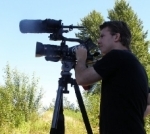
I grant that people have bigger things on their minds today – amid Japanese tsunamis and nuclear meltdowns – than a video about farmland in BC. Nevertheless, I feel it important to comment on a recent incident that raises real concerns for me as an environmental filmmaker about public processes and free speech in BC.
A couple of weeks ago I attended the opening evening of Delta Council’s hearings on updating the Tsawwassen Area Plan (Tsawwassen being one of three communities that make up the municipality of Delta) and a proposal to return the Southlands property to the Agricultural Land Reserve. The Southlands is a 500 acre parcel of farmland in Tsawwassen that has been the subject of intense debate for years. Over the past three decades, successive owners have pushed to build thousands of homes there against the will of the majority of the community, which would prefer to see it preserved for agricultural use and as habitat for the millions of migratory birds who pass through Delta every year on the Pacific Flyway.
I had just produced a short documentary (scroll down to see) with the support of a number of Tsawwassen citizens examining the Southlands issue in the context of our region’s mounting food security crisis (we produce less than half our own food in BC today and many readers will have seen recent headlines about dramatically rising food prices). We wanted to screen the film at the hearing and formally submit it to council along with other written submissions.
I arrived with several of these citizens hours before the event to speak to municipal staff about playing the film. We connected with the technical team and provided the film in a format that suited them – we tested it and it was all queued up to play during the hearing. Two of us also signed up to speak in succession early on in the hearing – our intention was to allocate our respective five minute slots to playing 10 minutes of the film. What ensued that evening and in the following days would have been comical if it didn’t raise some serious questions about our ability to plan a sustainable future for the region and province.
When my five minutes came about, I began to introduce the film – amidst considerable heckling from audience members supporting Southlands owner Century Group’s plans to build 1,900 homes on the property. Council then spent close to 10 minutes debating whether a 10 minute film could be played, eventually deciding to allow just the first five minutes.
The question of whether a video can be submitted in lieu of standard oral comments was a subject of heated debate amongst council. The municipality’s chief administrative officer George Harvie suggested it was unfair to those who supported the development as they didn’t have time to prepare their own video (we spent 6 months preparing ours – apparently the developer lacked our foresight). The idea that a developer who has clearly spent large sums of money promoting and lobbying for a billion dollar housing development could be outmatched by a citizen video is of course laughable. And council eventually backed down when a member of our group pointed out that the developer had been allowed at past hearings to make audio-visual presentations. So we played five minutes of the film – after which the world, remarkably, appeared to be turning as usual.
It was the following night, during round two of the hearing, that things got downright bizarre. In my absence, one of our group attempted to submit the second half of the film to the proceedings. Not only were they denied that request, but Delta Mayor Lois Jackson informed the audience the film would not be allowed even as a submission to be viewed by council outside of the public meetings. Having said the night before they would watch the full film on their own time, they had now changed their minds.
According to the Delta Optimist, “Jackson read a statement noting council had received legal advice from municipal solicitor Greg Vanstone, who said the remainder of the video should not be viewed by council ‘due to potentially defamatory or inaccurate statements.'” What were these statements? Council couldn’t know because, after all, they hadn’t seen them. We were directed to ask Mr. Vanstone just what these allegedly inaccurate and defamatory statements were – but he told us he couldn’t divulge specifics on account of attorney-client privilege.
So council impugned my name and work through spurious innuendo. But they went even further than that. Mayor Jackson added, “I would request that anyone who wishes to display another video immediately provide a copy to Mr. (George) Harvie so that it may be reviewed by our solicitor to ensure that it is appropriate for display.” So from now on, anyone who wants to present a video to council must gain prior approval from bureaucrats.
As a filmmaker concerned with environmental and public policy issues in BC, this incident raises a couple of important questions:
Public processes should be engineered with one main purpose in mind: maximizing citizens’ opportunity to express their concerns to governments and regulatory bodies. Everything should be oriented toward that goal – and creative expression and modern technology should be encouraged if they help further it. Instead, what we often find – whether it’s a rubber stamp environmental assessment meeting to do with a private power project or municipal hearings like this one in Delta – is an adversarial environment geared towards controlling, obstructing and restraining public expression at every turn.
At the end of the day, it’s simply foolish for council to attempt to hold back a film like this. Within days of the debacle at the hearing, we had it on youtube. And of course, the implied allegations made by council have proven to be a bunch of baloney. All we did is present an accurate assessment of BC’s food security challenges and a positive vision for the Southlands property within that context.
What worries me is that this is far from the first time this situation has arisen at a public hearing in BC. Filmmaker Susan Smitten’s film “Blue Gold” was met with fierce opposition from Taseko Mines at the federal review panel hearings on the proposed Prosperity Mine. After much wrangling, the film was finally played. And the controversy only heightened the focus on the film – just as happened recently with the Southlands hearing. Inasmuch as free speech is integral to good public policy, we can’t allow processes that limit this essential Charter right.
When they do, there’s always youtube.

A new 13 min documentary – produced by filmmaker Damien Gillis in
partnership with a number of Tsawwassen groups and citizens – is now
available online, after having been banned by Delta Council from public
hearings they are currently conducting. “Saving the Southlands” tells
the story of the 30-year battle to protect a 500-acre parcel of prime
farmland in Tsawwassen from proposed housing development – set against
the backdrop of an emerging food security crisis in BC….Now see for yourselves the film Delta
Council has tried to keep from the public. read more below
The film was recently censored by Delta Council after attempts to submit
it to a hearing on the question of returning the Southlands property to
the ALR. Having allowed the first five minutes to be
played on the opening night of the hearing – over the vocal objections
of supporters of owner Century Group’s proposed development of 1,900
homes on
the property – Council refused the following evening to play the
remainder. What’s more, they refused even to allow the film as a
submission for
councillors to view privately, on the grounds that it “may contain
libel” – pending prior “vetting” and approval by a bureaucrat. They made this statement without having seen the film for
themselves – which begs the question, how do they know it “may contain
libel”? Moreover, why should a film submission be treated any
differently than a spoken one – and if all future video submissions are to require “vetting”, as council has stated, why should video presentations be subjected to different standards than oral ones? Does this not open the door to the “vetting” of all submissions to public hearings – by bureaucrats, no less? Imagine the next time you go to speak at a hearing on an industrial project that threatens the environment in your community, you have to gain government approval for you remarks before delivering them! Is this not a slippery slope?
“Saving the Southlands” features a number of Tsawwassen residents,
Richmond City Councillor and ALR co-founder Harold Steves, agrologist
Arzeena Hamir, and also profiles several local community farming success
stories. The film is a unique new media story – funded entirely by
citizens, a number of whom were also involved in the production. Its
release comes in the midst of a landmark public hearing after which
council will vote on whether to apply to the Agricultural Land
Commission to return the Southlands to the ALR. The property was removed
30 years ago under questionable evidence, but has remained protected by
its municipal agricultural zoning. Owner Century Group has been ramping
up its efforts over the past year to get that changed. Now inclusion in
the ALR could finally bring this saga to a close, opening the door to
other potential models, such as a land trust with urban farming and
nature conservancy components, favoured by many int he community.